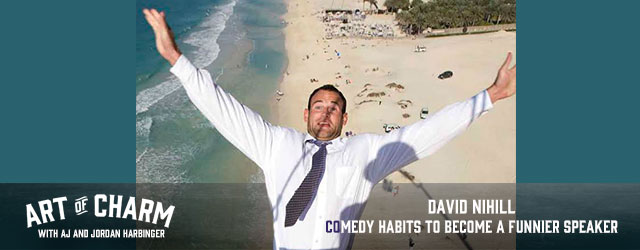Humor connects you and your audience.
“There’s nobody more judged than a stand-up comedian.”-Jerry Seinfeld
The Cheat Sheet:
- How to have people talking about your speech after it ends, in a good way.
- 22 hours of work go into 1 minute of a 60-minute stand up comedy set: true or false?
- Are keynotes dead?
- The rule of 3 (‘tree’): what is it and how to use it.
- What is rehearsed spontaneity?
- And so much more…
Have you ever been in the audience for a speech so boring everyone around you stopped listening and starting doing other things? Is it your worst fear that someday YOU will be speaking and will be that dull? David Nihill is here to help us all be better public speakers through comedy.
David is a comedian and public speaker who was once terrified of being in front of an audience! Hear how he went from a terrified public speaker to a stand up comedian killing it on stage, and all the applicable comedy habits he learned along the way. Join us for all of that and more on episode 341 of The Art of Charm.
More About This Show:
For many of us public speaking is our top fear, even greater than our fear dying. As the joke goes “We’d rather be IN the casket than giving the eulogy at a funeral.” But if you’re wanting to face that, or are in a position where you must face that fear, today’s chat with David Nihill will give you some tools you can use to overcome your fear and give a great presentation.
Not long ago David was rubbish at public speaking, he dropped far too many F bombs and was generally a nervous, sweaty mess. When one of his friends suffered a severe spinal cord injury David wanted to help raise funds. He suggested organizing a comedy show with top comedians as a fundraiser and the idea took off. The only glitch? David’s friend insisted he give the opening speech, and David was petrified.
Instead of backing down from the challenge, David emulated one of his mentors Tim Ferriss and rose to the occasion. He took a very Tim-like approach to the subjects of comedy and public speaking. He wanted to break down the best speeches and comedic routines to figure out how he could follow in their footsteps. Were there common processes for both? Did the two overlap and if they did, how could he fuse them together to make his opening speech funny and well-received at his friend’s fundraiser?
David went through a laborious and intensive study, and it paid off. His opening for the fundraiser was well-received, so much so that he was invited to open for a group of comedians at The Punch Line in San Francisco.
And that opened a new door for him. Today he has performed comedy routines at some of the top comedy clubs in California, he held the first Funny Bizz conference in 2014 and has just published his first book 7 Comedy Habits to Be a Funnier Speaker.
On today’s show David explains a few of the many lessons he’s learned about public speaking and comedy. The first topic we touch on is how to use humor in your presentations and speeches. Humor is the easiest way for others to relate to you, so use it early on in your speech to connect with your audience. If you’re coming to their town learn something about the city you’re in and use it humorously to show your audience you care about where they live and what their lives are like there.
Humor also makes your speech or presentation memorable;it accomplishes this by breaking down barriers between you and them. If you can break down those barriers and make people laugh, they will remember you and will be talking about you long after you’ve finished speaking.
All of that is well and good but how do you make people laugh? Is there a formula or a process we can take from comedy and apply to public speaking? There are several and we go into each of them on this episode; the one we’ll discuss here is evaluating your performance. The best public speakers and the best comedians all evaluate themselves.
Yes it’s awkward, uncomfortable and unpleasant, but it is how anyone improves anything they do (especially public speaking and stand up comedy). So record yourself and dissect what you do, how you do it. Look at what worked, what didn’t work, trim out everything you can and hone in on the good stuff. Get a coach to help you if you can.
David dishes out other ways we can make our speeches and presentations funny and memorable including using the art of the callback and the rule of 3. So tune in to hear all of that and more, then join me in thanking him for the laughs and the learning. He was an awesome guest and you’re awesome for listening. Thanks and we’ll see you next time!
THANKS DAVID NIHILL!
Resources from this episode:
7 Comedy Habits to Become a Funnier Speaker
Robin Williams crashes TED BBC Conference
You’ll also like:
-Best of The Art of Charm Podcast
Wanna leave a comment? Too bad! Email me instead (we read everything)!
